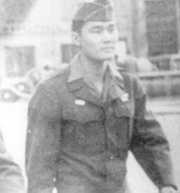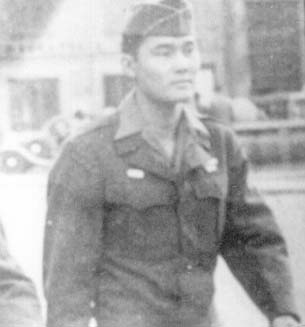
Japanese American Military Experience Database

Isao Kikuchi
Gender
Male
Birth date
1921-12-9
Place of birth
Los Angeles CA, U.S.A.
Inducted
1944-2-6, Ft.Sheridan IL
Enlistment type
Draftee
Service branch
Army
Service type
War
Unit type
Combat
Units served
442nd Regimental Combat Team, Co. F
Military specialty
Automatic Rifleman
Stationed
USA; France; Italy.
Separated
Camp Beale CA
Unit responsibility
To spearhead campaigns/battles
Personal responsibility
Automatic Rifleman
Major battles (if served in a war zone)
North Appennines; Po Valley; Rhineland
Awards, medals, citations (individual or unit)
Europe African Middle Eastern Campaign;
Distinguished Unit Badge; Good Conduct;
WW II Victory Medal;
Combat Infantryman Badge;
Army of Occupation.
Living conditions
1). Living conditions during basic Training were much the same as in Manzanar....rows and rows of barracks, mess halls, common latrines and confined by barbed wire. In Manzanar we slept, played and worked when boredom took over...In Camp Shelby we lived in similar barracks, confined by the military and prepared for war.
2). Combat meant sleeping on dirt, cement, in foxholes we dug whenever we could find shelter. We didn't bathe until we were replaced from the front line of combat but rinsed ourselves hastily whenever we passed through a village with a fountain. Our toilets were wherever we dug a hole.
3). Men from the rear delivered our meals. They brought K-rations in boxes designed to fit into the large pockets of our uniforms. Breakfast was a can of scrambled eggs, a few crackers, chewing gum, a small packet of cigarettes, a packet of powdered orange juice and a candy bar. Other meals were similar but the main dish varied. When we were rotated from the front line our kitchen cooked 'C' rations. This meant warm canned foods such as spam or corned beef which caused diarrhea in many of us. 4). During combat primary entertainment was cleaning weapons and sleep.
Most vivid memory of military experience
We were pinned down by fire all day on Mt. Belvedere. Darkness fell and the war stopped as though a work-day funished. We dug in 30 or 40 yards below the enemy. Tak Fudena and I positioned ourselves on the extreme flank and looked into pitch-blackness. Tak held his rifle firmly in his hands and took the first watch. I fell asleep instantly and dreamt of Germans. Tak felt a tug on his rifle. He tugged back. He heard German and realized that the enemy was at the other end. A tug-a-war began. Tak could not fire his rifle because of his gloves. He pulled and the German pulled....the German tore away Tak's rifle and Tak yelled, 'Gerry!' I sprang up with arms spread and grabbed air. I ended below our fox-hole with my mouth full of dirt. I grabbed my BAR ...Fudena pointed. I fired a burst in the blackness and the mountain lit up like a stage play on Broadway. After the sparks in our eyes cleared, Tak pointed in another direction and said, 'He went that way'. I asked, 'Why did you point the other way?' He replied, 'I didn't want anyone to get hurt'. I realized that there was more to 'war' than I thought but was curious how Tak thought as he fell back into deep sleep this time without dreams of Germans.
Missed most whilst in the military
I missed my girlfriend...currently my wife.
Most important thing, personally, to come from military experience?
The most important thing I learned during combat was that I did not run and hide when the firing started. I gained self-confidence, stood tall and became a man.


